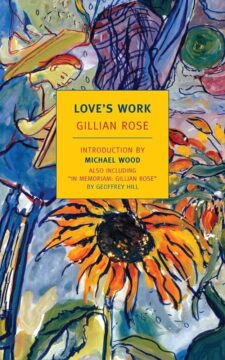Maya Krishnan at The Point:
 “I may die before my time.” The English philosopher Gillian Rose (1947-1995) opened one of her final lectures with these words; soon after, she would die of cancer at the age of 48. Rose’s words were doubly prescient. While her reputation has long been overshadowed by that of her more famous sister, the literary critic Jacqueline Rose, Gillian’s time seems to have arrived at last. Earlier this year in the U.K. Penguin Classics reissued Rose’s forthright memoir Love’s Work (1995), for which she is best known. The book, with its intimate yet unsentimental portrayal of sex, illness and death—in response to her cancer diagnosis, the author reaches “for my favourite whisky bottle” and vows “not to cease wooing, for that is my life affair”—has captivated many of its readers. London’s literati gathered in April at the London Review Bookshop for an event on Love’s Work, and preparations are already underway to mark the thirty years that have passed since the book’s publication and Rose’s death.
“I may die before my time.” The English philosopher Gillian Rose (1947-1995) opened one of her final lectures with these words; soon after, she would die of cancer at the age of 48. Rose’s words were doubly prescient. While her reputation has long been overshadowed by that of her more famous sister, the literary critic Jacqueline Rose, Gillian’s time seems to have arrived at last. Earlier this year in the U.K. Penguin Classics reissued Rose’s forthright memoir Love’s Work (1995), for which she is best known. The book, with its intimate yet unsentimental portrayal of sex, illness and death—in response to her cancer diagnosis, the author reaches “for my favourite whisky bottle” and vows “not to cease wooing, for that is my life affair”—has captivated many of its readers. London’s literati gathered in April at the London Review Bookshop for an event on Love’s Work, and preparations are already underway to mark the thirty years that have passed since the book’s publication and Rose’s death.
But if Rose’s time has arrived, it seems that it is Rose the memoirist, not Rose the philosopher, whom the world is ready to meet. That’s a shame, in part because it is an all-too-familiar story for a female philosopher’s reception to foreground her personal life. It’s also a missed opportunity.
more here.
